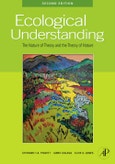This widely anticipated revision of the groundbreaking book, Ecological Understanding, updates this crucial sourcebook of contemporary philosophical insights for practicing ecologists and graduate students in ecology and environmental studies. The second edition contains new ecological examples, an expanded array of conceptual diagrams and illustrations, new text boxes summarizing important points or defining key terms, and new reference to philosophical issues and controversies. Although the first edition was recognized for its clarity, this revision takes the opportunity to make the exposition of complex topics still clearer to readers without a philosophical background.
Readers will gain an understanding of the goals of science, the structure of theory, the kinds of theory relevant to ecology, the way that theory changes, what constitutes objectivity in contemporary science, and the role of paradigms and frameworks for synthesis within ecology and in integration with other disciplines. Finally, how theory can inform and anchor the public use of ecological knowledge in civic debates is laid out. This new edition refines the understanding of how the structure and change of theory can improve the growth and application of one of the 21st century's key sciences.
Please Note: This is an On Demand product, delivery may take up to 11 working days after payment has been received.
Table of Contents
Part I: Advancing the Discipline and Enhancing Applications1. Integration in Ecology2. Understanding in Ecology
Part II: The Nature of Theory3. The Anatomy of Theory4. The Ontogeny of Theory5. The Taxonomy of Theory
Part III: From Theory to Integration and Application6. Fundamental Questions:Changes in Understanding7. Integration and Synthesis
Part IV: Theory and Its Environment8. Constraint and Objectivity in Ecological Integration9. Ecological Understanding and the Public








